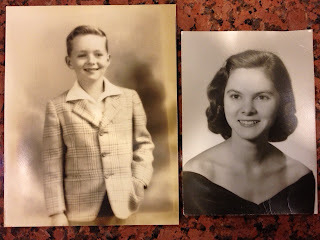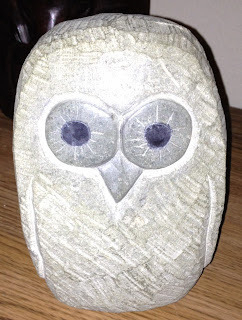A Gift Of A Sponge
My father bundled us into our hats and coats and then into his little red VW and drove us to the Caldor store in Kingston. The first Christmas I can now remember was fast approaching, and he wanted my brother, my sister and me to choose gifts for our mother.
I had no idea how to shop, of course, so my father asked me to think about what my mother liked. The only thing I could think was that I often saw her cleaning things: washing dishes, cleaning floors and windows, doing laundry. Obviously, she must like cleaning quite a lot.
So I decided to buy her a sponge.
My father balked at this, but I insisted. This is what she likes, this is what I want to buy.
Two events that followed have imprinted themselves forever on my memory, have made me forever grateful to my parents.
First, Dad let me buy it. It's not at all what he would have chosen. But he gave me the gift of letting me decide, the gift of the long, slow welcome into responsible adulthood.
Second, mom loved it. Let me clarify that: she loved the gift, and she thanked me warmly and genuinely, smilingly. And so she gave me a gift as well, the gift of teaching me how to receive the offerings of others with grace; the gift of her love that consecrated my poor offering.
Both of them gave me another gift as well, of course: I had no money to buy the sponge, so I used theirs. I took their money and spent it on what they did not need, on a gift that, coming from another person or from me at a different age, would have been offensive. They gave me the gift of ennobling my shabby token into a gift of great worth.
No year of my life has passed in which I have not thought of that kitchen sponge. It reminds me that no act of kindness towards a child is wasted. It reminds me of my parents' love for me, love that I fumblingly attempt to pass on to my children as I seek to give them the difficult gift of autonomy.
And my parents, in that Christmas, gave me hope that the poor offerings of my worship - in which I spend what is not really mine in order to give a gift that is not really needed - might really matter, not because they are intrinsically great, but because of the love and grace with which they might be received, and consecrated.
I had no idea how to shop, of course, so my father asked me to think about what my mother liked. The only thing I could think was that I often saw her cleaning things: washing dishes, cleaning floors and windows, doing laundry. Obviously, she must like cleaning quite a lot.
So I decided to buy her a sponge.
My father balked at this, but I insisted. This is what she likes, this is what I want to buy.
Two events that followed have imprinted themselves forever on my memory, have made me forever grateful to my parents.
 |
| Dad and Mom were young once, too. |
Second, mom loved it. Let me clarify that: she loved the gift, and she thanked me warmly and genuinely, smilingly. And so she gave me a gift as well, the gift of teaching me how to receive the offerings of others with grace; the gift of her love that consecrated my poor offering.
Both of them gave me another gift as well, of course: I had no money to buy the sponge, so I used theirs. I took their money and spent it on what they did not need, on a gift that, coming from another person or from me at a different age, would have been offensive. They gave me the gift of ennobling my shabby token into a gift of great worth.
No year of my life has passed in which I have not thought of that kitchen sponge. It reminds me that no act of kindness towards a child is wasted. It reminds me of my parents' love for me, love that I fumblingly attempt to pass on to my children as I seek to give them the difficult gift of autonomy.
 |
| A gift from my students; it means more to me than words can easily say. |
And my parents, in that Christmas, gave me hope that the poor offerings of my worship - in which I spend what is not really mine in order to give a gift that is not really needed - might really matter, not because they are intrinsically great, but because of the love and grace with which they might be received, and consecrated.